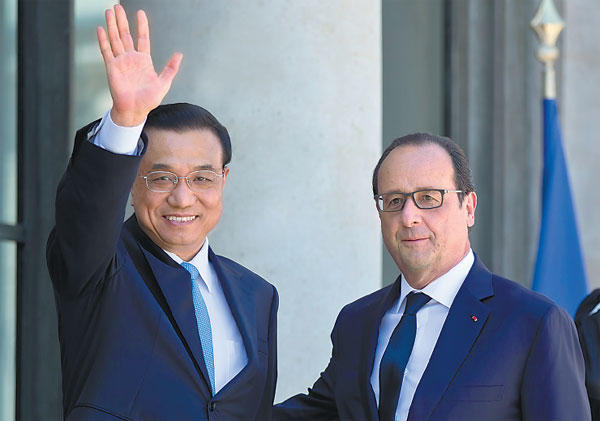Li promises carbon cuts




Sets steeper goals sooner than earlier schedule, cuts in energy consumption
Premier Li Keqiang laid out ambitious targets for a reduction in carbon emissions during his visit to Paris on Tuesday.
"China's carbon dioxide emissions will peak by around 2030, but China will work hard to achieve the target at an even earlier date," Li said.
The nation also aims to increase the share of nonfossil fuels in its primary energy consumption to about 20 percent by 2030, while reducing energy consumption per unit of economic output by 60 to 65 percent from its 2005 level.
Li announced the targets after meeting with French President Francois Hollande in Paris, which will host United Nations Climate Conference in December.
Li's announcement came the same day that China submitted its commitment plan to the UN, drawing immediate and wide-ranging applause from environmental circles.
Jennifer Morgan, global climate director of the climate program at the World Resources Institute based in Washington, said China's plan reflects its firm commitment to addressing the climate crisis.
"Already, 40 countries have released their national commitments, showing the growing momentum behind international climate action this year," she said.
Morgan believes that China is largely motivated by its strong national interests to tackle persistent air pollution problems, limit climate impacts and expand its renewable energy job force. More than 3.4 million people in China are already working in the clean energy sector.
"China's new 60-to-65 percent intensity target demonstrates its intent to decarbonize its economy," she said. "The country's commitment was made possible by its ambitious clean energy policies and investments enacted over the past decade. China has been rapidly expanding its wind and solar power and continues to be the global leader in renewable energy investment."
Morgan said that meeting this goal won't be easy, but research shows that with a sustained commitment China can reach its target even before 2030. "This commitment will benefit China and represents a serious and credible contribution to tackling climate change," she said.
Rhea Suh, president of the Natural Resources Defense Council (NRDC), which has offices both in the US and China, said in a statement that China's climate commitment sets it on a clear path to transition away from heavily polluting coal to cleaner and sustainable energy sources like wind and solar.
"This transition to clean energy will also lead to cleaner air and improved health for its citizens. Today's news sets the stage for the development of a strong international climate treaty later this year," Suh said.
Jake Schmidt, director of the international program of NRDC, said China's new carbon intensity target and a national coal cap policy should lead to a lower and earlier peak to emissions.
"This new carbon intensity reduction target of 60-to-65 percent below 2005 levels by 2030 could lead to emissions significantly lower than previous estimates," he wrote on his NRDC blog.
Bob Perciasepe, president of the Center for Climate and Energy Solutions, said China's announcement is a clear sign that "we're moving past the old developed-developing country divide to a new understanding that all major economies have to contribute their fair share to the global effort.
"China understands both the risks and the opportunities posed by climate change and is placing its bets on a low-carbon future. Its intended contribution represents a significant undertaking beyond business-as-usual and will help slow the rise in global greenhouse gas emissions," he said in a statement.
Perciasepe said the US and China can no longer use inaction by the other as an excuse for ignoring the risks the world faces from climate change. "Both countries are acting. Working together they can help lead countries to common ground in Paris," he said.
In Beijing last November, Chinese President Xi Jinping and US President Barack Obama reached a landmark agreement on climate change, committing the two countries to substantial carbon reduction, a move that has been widely regarded as setting a good example for other nations to follow.
In Washington on Tuesday, Obama and visiting Brazilian President Dilma Rousseff agreed to work together to phase down the production and consumption of potent hydro-fluorocarbon greenhouse gasses under the Montreal Protocol.
"I am very happy that Premier Li has announced the ambitious targets in my city, which has shouldered the great task of saving this planet this year," said Pierre Calame, president of the Paris-based China-Europa Forum Foundation.
Calame said Li's announcement is "good news and big news. I have seen the Chinese government's serious commitment." But he said that realizing such targets depends heavily on changing the way of life for the Chinese people.
"It also depends on China upgrading its economic structure," Calame added.
Calame said that in addition to China's efforts, the US and Europe should cut their energy consumption if they are serious about fighting climate change.
Fredrik Erixon, director of the Brussels-based European Centre for International Political Economy, said China is clearly making a serious pitch to assume responsibility in the politics of global climate change.
"While there does not seem to be much news in the new plan, its combination of various contributions allows for a meaningful negotiation at the Paris summit later this year," said Erixon.
"China is key to getting a new agreement together, and even if its new proposal falls short of satisfying other key economies, it is the foundation for a start to negotiations that must have higher ambitions if the targets are to be achieved," Erixon added.
Contact the writers at fujing@chinadaily.com.cn and chenweihua@chinadailyusa.com.
Gao Shuang contributed to the story in Brussels.
|
Premier Li Keqiang and France's President Francois Hollande greet the media at the Elysee Palace in Paris on Tuesday. Michel Euler / AP |















